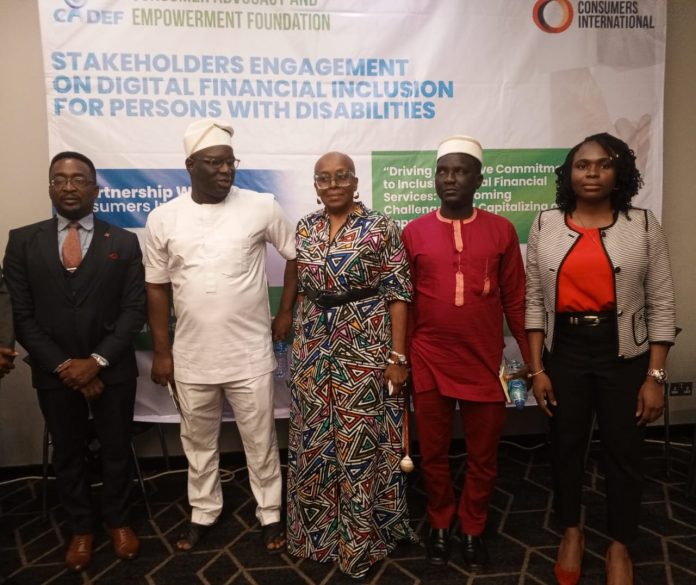Lagos, Nigeria – At a groundbreaking workshop organized by the Consumer Advocacy and Empowerment Foundation (CADEF) in Lagos, experts from various fields converged to discuss the crucial need to improve access and inclusion for persons with disabilities (PWDs) in digital financial services. The event, themed “Improving Access and Inclusion for People with Disabilities in Digital Financing,” highlighted the invisible barriers faced by PWDs in everyday financial interactions and proposed tangible solutions to create a more inclusive digital economy.
The Case for Universal Design in Financial Services
One of the keynote speakers, Mr. Lukeman Salami, a seasoned legal practitioner with years of experience in disability rights, shared his firsthand experience of the numerous challenges PWDs face in accessing even the most basic financial services. Drawing attention to the concept of universal design, Salami stressed that the design of products and services must cater to everyone, regardless of their physical or cognitive abilities.
“Universal design means creating products and services that are usable by everyone, regardless of their abilities,” Salami explained. “By embracing this principle, financial institutions can ensure that people with disabilities have the same opportunities to access and utilize financial services as their peers.”
Salami’s call to action went beyond moral and ethical considerations, framing universal design as a strategic business decision. “Studies have shown that inclusive financial services can lead to increased customer satisfaction, loyalty, and revenue. By catering to the needs of people with disabilities, financial institutions can tap into a vast and underserved market segment,” he emphasized, urging financial institutions to view inclusion not only as a social responsibility but also as a way to unlock new market opportunities.
Barriers to Accessing Financial Services
Adding to Salami’s points, Safiu Babatunde, head of legal services at the Lagos State Office for Disability Affairs, provided a detailed overview of the obstacles faced by PWDs in accessing both traditional and digital financial services. Babatunde noted that despite advances in technology, many financial services remain inaccessible to a significant portion of the population with disabilities.
“Disability-related obstacles affect the participation of individuals at every stage of developmental interventions intended to boost livelihoods. Key among the resources essential for enhancing the livelihood of individuals is access to financial resources for undertaking economic activities,” Babatunde said.
He pointed out that traditional banks, over the years, have failed to adequately serve the needs of PWDs. “Persons with disabilities have limited access to financial services, including traditional and alternative banking, online payment services, financial transactions, and mobile banking applications,” Babatunde added. “This exclusion from financial resources prevents PWDs from fully participating in the economy, limiting their ability to invest, save, or build wealth.”
Babatunde’s remarks brought to the forefront the need for innovative solutions to address these long-standing issues. He argued that technology could be a powerful tool to bridge the gap, but only if financial institutions are committed to making their services accessible to all.
Public-Private Partnerships: The Way Forward
One of the most critical suggestions made during the workshop was the need for greater collaboration between the public and private sectors. Babatunde passionately advocated for public-private partnerships (PPPs) as a solution to promote financial inclusion for PWDs.
“This partnership can bring together government agencies, financial institutions, and disability organizations to collaborate on developing and implementing initiatives that promote financial inclusion for these concerned populations,” he said. Babatunde proposed that such partnerships could foster the development of accessible financial technologies and services, ensuring that PWDs are not left behind in the digital financial revolution.
He further explained that the government has a crucial role in setting policies that mandate accessibility standards, while the private sector must innovate and invest in technologies that provide PWDs with equal access to financial resources.
CADEF’s Commitment to Financial Empowerment
In her opening remarks, Professor Chiso Ndukwe-Okafor, executive director of CADEF, reaffirmed the organization’s commitment to promoting financial inclusion for marginalized communities, particularly persons with disabilities. She explained that CADEF has been at the forefront of advocating for inclusive financial products and services, aiming to bridge the gap between PWDs and the financial resources they need to thrive.
“We have already successfully empowered over 50 persons with hearing disabilities and over 30 persons with visual disabilities,” Professor Ndukwe-Okafor proudly shared. “We empowered them through financial literacy training, we listened to their voices, and now this final session is about taking our commitment to the next level.”
Professor Ndukwe-Okafor explained that CADEF’s efforts go beyond training; the foundation actively works to ensure that the voices of PWDs are heard and that financial products are tailored to their specific needs. “Financial inclusion is not just about access; it’s about empowerment. We are here to make sure that people with disabilities are not only included in the financial system but are also empowered to succeed within it,” she emphasized.
A Call to Action
The workshop concluded with a resounding call to action for all stakeholders—financial institutions, policymakers, and advocates for persons with disabilities—to collaborate in building a financial ecosystem that leaves no one behind. With increasing reliance on digital platforms for banking and financial transactions, the experts underscored the urgency of ensuring that accessibility is integrated into every step of the financial service delivery process.
For financial institutions, the message was clear: inclusive design is not just good ethics, it’s good business. By investing in accessible technologies and removing barriers to entry, banks and fintech companies can not only enhance their reputations but also tap into a vast, underserved market that holds immense potential.
The workshop served as a critical reminder that for Nigeria to achieve true financial inclusion, it must consider the diverse needs of all its citizens. Persons with disabilities, often overlooked in the design of digital services, must be placed at the center of conversations about financial access and empowerment.
As CADEF and its partners continue to champion this cause, the hope is that more institutions will take up the challenge, ensuring that the future of finance is inclusive, accessible, and empowering for all.


